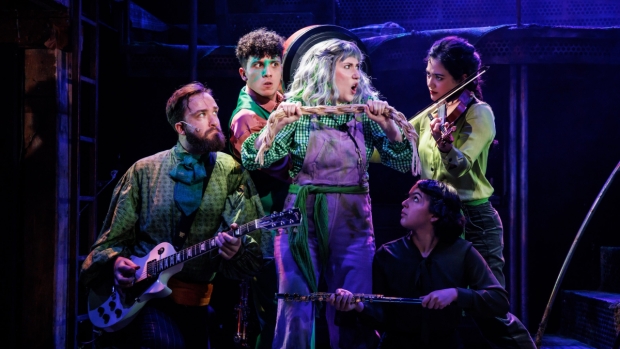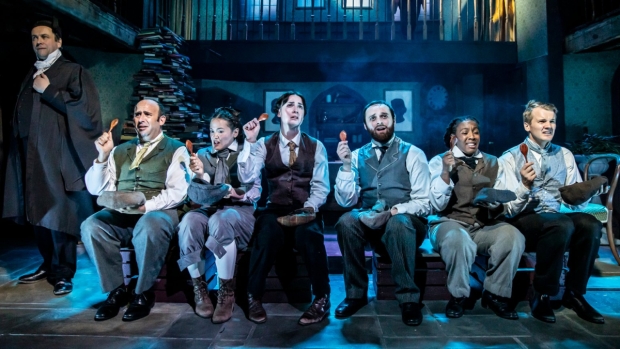”The Suspicions of Mr Whicher” at the Watermill Theatre – review

© Pamela Raith
If you’ve neither read Kate Summerscale’s award-winning documentary page-turner The Suspicions of Mr Whicher, or the Murder at Road Hill House, nor seen the gripping serialised TV adaptation, the clue in the programme for Alexandra Wood’s intriguing stage adaptation at the Watermill that this is a real-life crime story is the apparently contemporary street ballad there.
It’s illustrated with a huge hangman’s noose dangling menacingly next to a sepia photograph of Constance Kent, jailed for the horrific murder of her three-year-old half-brother to which she confessed in 1865. Her confession meant she was not sentenced to death, but to a lengthy period of imprisonment, which she actually survived, to die at the great age of 100, in her bed.
This is not giving anything away that might lessen your enjoyment of this wonderfully concise retelling and reexamination of the facts, the ‘cast’ of players and suspects and the motives and explanations behind/for the crime.
The very confines of the Watermill stage are put to unsettling use by designer Amy Jane Cook’s stark jailhouse set, in the last of the various prisons in which Constance served out her many years of incarceration, for she is about to be released at last. We get to eavesdrop on a series of intense conversations Wood ‘reconstructs’ between Constance and the eponymous Mr Whicher, the police officer who found himself compromised as he oversaw her confession and conviction.
Parallels with contemporary condemnation of police force, it seems the accusations and opprobrium were there/rife from its creation.
Jonathan Whicher was one of the first police officers to join Scotland Yard’s newly formed Detective Branch and probably the first to be dubbed ‘detective-sergeant’. His stellar rise was not without its controversies, making him an ideal model for fictional detectives, of all our favourite TV ‘tecs’. Indeed when he was called in to help the local police in the West Country village site of Road Hill House, the Kent family home at which the murder took place, he was at the height of his fame and powers. Contentions over the case meant it was only ‘solved’ five years later when Constance confessed and Jonathan Whicher was criticised in the press for his failure. There is a telling modern parallel here with contemporary criticism surrounding the police force.
Wood’s coup de theatre is to imagine Constance granting Whicher access to visit her Christopher Naylor’s almost agonised characterisation makes it clear that he is ever horribly fascinated by Constance and the crime to which she has confessed, haunted by the possibility that confession might be false.
Eleanor Wyld’s outwardly calm Constance begins by seeming almost cool and measured, perhaps from the years she has had to contemplate her situation and the confession to a horrific crime that has led to it. But Wyld wonderfully conveys the almost paralysing inner anguish of her mental state, her innate intelligence that is almost in conflict with her emotional intelligence.
So in that claustrophobic setting, often with Constance and Whicher on either side of the stage as if once again facing each other in court, they ‘reconstruct’ the circumstances of the murder, conjuring the main players, the members of her dysfunctional family, to act out Constance’s revelations.
In this patriarchal Victorian society, the paterfamilias, Constance’s father, is the prime mover. His covert relationships follow a pattern of affairs with the children’s nannies. Indeed he actually marries Nanny Pratt, after pursuing his affair with her, even as his first wife Mary Ann was on her death bed. Both Jim Creighton’s lustful Mr Kent and Robyn Sinclair as the women who eagerly share his bed, conjure the gleeful sexual transgressions that simmer beneath their prim Victorian exteriors, with Kent, as the all powerful man making the running every time.
So little Francis is the product of Kent’s marriage with Miss Pratt and here Constance looks back on an adolescence where she shows herself and her full brother William sidelined, even neglected, in favour of her younger half siblings. Constance’s closest relationship is indeed with William and this fraternal connection is powerfully explored by Wyld and Sam Liu’s intelligently and decisively proactive William. Does Whicher speculate on what they might have got up to together and does Constance egg him on or reveal the truth he still seeks?
The possible permutations of what might have occurred are exhaustively reexamined to an extent that could indeed have become exhausting, if it were not for the power of the writing, the direction and above all the acting out of Constance’s memories and reconstructions.
Katy Morrison’s lighting and Rachel Sampley’s projections contribute wonderfully effectively to taking the audience out of the prison and into the metaphorical prison of the family home that Constance reimagines in her reconstructions of the past. The story unfolds with pleasing clarity in a remarkably concise drama that sends its audience out of the theatre with plenty to discuss on the homeward journey.













